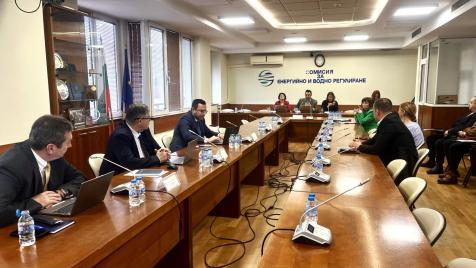Changes to the Euro Act give the state the right to crush any business
The unclear approach of regulators threatens both wage growth and investment activity in the country

© ECONOMIC.BG / Depositphotos
The proposed amendments to the Law on the Introduction of the Euro in Bulgaria give “the state a chance to crush any trader” who tries to develop a business.
This was stated by Petar Ganev, senior researcher at the Institute for Market Economics (IME), in a comment for Economic.bg.
We discussed with him the amendments to the law adopted at first reading in the National Assembly, which give greater powers to regulators (the National Revenue Agency, the Consumer Protection and Competition Commission), and even to the Council of Ministers, in the fight against "speculation" surrounding the euro. For traders, it provides for heavier fines if they decide to raise their prices "unreasonably."
These powers are completely meaningless, as there is no problem with the labels (editor's note: referring to dual pricing),” Ganev said.
According to him, the business community's concerns about the bill are “entirely justified,” as the text gives "blanket powers" to regulators, especially the Consumer Protection Commission (CPC).
The CPC is acquiring a whole new type of powers related to prices, something that does not fall within its remit in principle,” he added.
Impossible attempt to freeze prices
Ganev emphasized that extending the deadline for imposing sanctions for speculative prices from one month (as provided for in the original law) to 1.5 years (as proposed in the amendments) represents an “endlessly long period in which so many things change that there is no way to freeze the economy.”
According to him, many decisions on raising or lowering prices will be made during this period, and seasonal and administrative factors, including the increase in the minimum wage, will have an impact.
Under the current automatic mechanism, the MW is calculated as 50% of the average gross wage according to data from the National Statistical Institute (NSI) for the previous four quarters. The KNSB's calculations based on this mechanism show that next year the MW will jump by 12.3% to BGN 1,210, which will inevitably increase business costs.
This is an attempt to freeze prices, but it is impossible. There is no way to avoid changing prices, including downward, especially seasonal ones. We cannot expect the entire economy to simply fix prices,” Ganev added.
An increase in the minimum wage will ultimately affect prices. This will subsequently cause entrepreneurs to be much more cautious about investment activity and employee remuneration or increases in remuneration.
All this is likely to cool investment activity and may cool wage growth,” the expert predicted.
Plamen Nenov, professor at the Norwegian Business School, also touched on the topic in a conversation with Economic.bg.
Perhaps the most unclear part of these changes is the link to the labor market. In my opinion, it will be difficult to break the link between rising labor costs and prices, especially in services,” he said.
According to him, whether businesses should be concerned about the bill will depend precisely on the dynamics of the labor market and the extent to which businesses, if there is a rapid increase in labor costs, will be able to pass them on to prices.
It will be difficult to ban price increases, it sounds unrealistic,” the economist added.
Nothing new under the sun
Georgi Vuldzhev, an economic analyst at EKIP, also expressed his outrage at the bill in a post on his Facebook profile. In it, he wrote that there was nothing surprising in the proposals and that there was no way it could be “any different, especially in Bulgaria."
The proposals for price control are stupid and harmful, there is no doubt about that,” Vuldzhev wrote.
Petar Ganev warned that in the next 1.5 years, businesses will operate "in an environment of extreme uncertainty and expectation that at any moment the CPC or one of the other institutions will come and crush you not only with high fines and uncontrolled instruments, but also with requirements to give them full accountability of what, when, and at what prices.”
This is accountability that shows more of an interest in this business than an attempt to protect the public interest,” Ganev said.
According to Vuldzhev, in Croatia, the last country to join the eurozone before Bulgaria, “exactly the same thing is happening as is happening here.”
According to him, the country gave broad powers to the regulator to "regulate traders at its discretion” in order to deal with unjustified price increases.
We are entering precisely this scenario. Nothing new under the sun,” Vuldzhev added.
Georgi Kadiev, former deputy finance minister, shares a similar view.
According to him, the possibility for regulators to enter offices and request detailed information from stores will become "yet another weapon" against businesses. In his view, this will not stop the price increases set by retailers even before Bulgaria joined the eurozone.
The administration does not have the capacity to check everyone, but it does have the capacity to ruin the business of those who do not listen,” Kadiev added on his Facebook profile.
What are the working solutions?
When asked by Economic.bg what good practices Bulgaria could introduce to deal with the situation, Petar Ganev pointed out that it was already implementing them.
This is the practice – having dual pricing for a long period – at least six months before and one year after the new currency comes into force,” he explained.
The other is the dual circulation period, which will begin on January 1, 2026, and will last for one month.
“We see both of these as basic mechanisms, almost boring, not that interesting to us. So now let's come up with something new," Ganev said.
Kadiev wrote that the only thing that works is not a cap on markups, which can be circumvented, but a cap on prices for certain products and services, "as Croatia, Hungary, and France do.”
Translated with DeepL.

 Simona Gotsova
Simona Gotsova 



